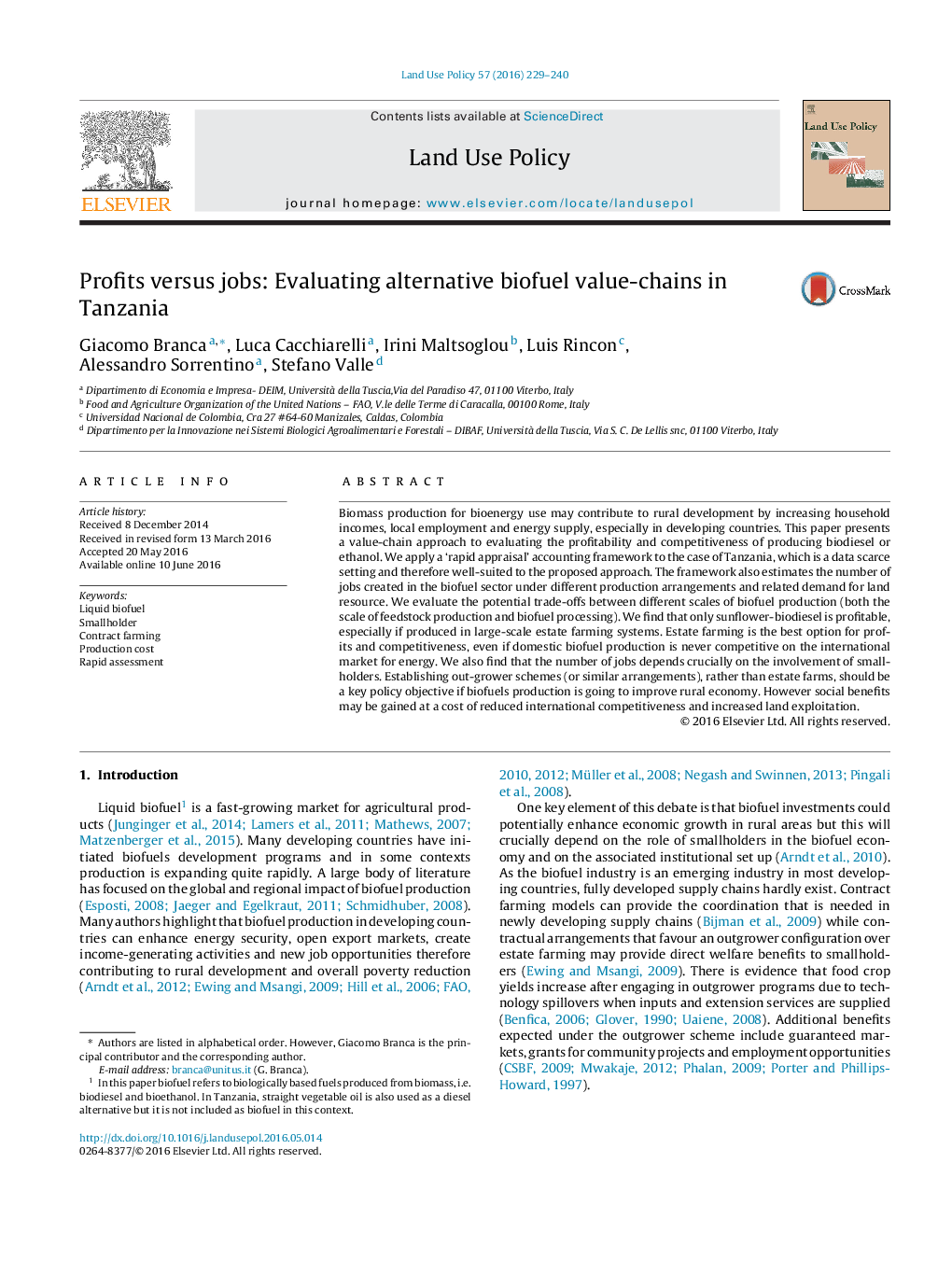| کد مقاله | کد نشریه | سال انتشار | مقاله انگلیسی | نسخه تمام متن |
|---|---|---|---|---|
| 6547008 | 160091 | 2016 | 12 صفحه PDF | دانلود رایگان |
عنوان انگلیسی مقاله ISI
Profits versus jobs: Evaluating alternative biofuel value-chains in Tanzania
ترجمه فارسی عنوان
سود در برابر شغل: ارزیابی زنجیره ارزش زیستی جایگزین در تانزانیا
دانلود مقاله + سفارش ترجمه
دانلود مقاله ISI انگلیسی
رایگان برای ایرانیان
کلمات کلیدی
ترجمه چکیده
تولید زیست توده برای استفاده از انرژی زیستی می تواند به رشد روستا کمک کند با افزایش درآمد خانوار، اشتغال محلی و تامین انرژی، به ویژه در کشورهای در حال توسعه. این مقاله یک رویکرد ارزش زنجیره ای برای ارزیابی سودآوری و رقابت پذیری تولید بیودیزل یا اتانول ارائه می دهد. ما چارچوب حسابداری "ارزیابی سریع" را در مورد تانزانیا، که تنظیمات کمبود داده است و بنابراین مناسب برای رویکرد پیشنهادی است، اعمال می کنیم. این چارچوب همچنین برآورد تعداد مشاغل ایجاد شده در بخش سوخت زیستی با توجه به توافق های تولیدی مختلف و تقاضای مربوط به منابع زمین را ارزیابی می کند. ما مقادیر بالقوه بین مقادیر مختلف تولید سوخت زیستی (هر دو مقیاس تولید مواد اولیه و فرایند سوخت زیستی) را ارزیابی می کنیم. ما متوجه می شویم که تنها روغن آفتابگردان بیودیزل سودآور است، به خصوص اگر در سیستم های بزرگ کشاورزی املاک تولید شود. کشاورزی املاک بهترین گزینه برای سود و رقابت است، حتی اگر تولید بیو سوخت داخلی داخلی در بازار بین المللی انرژی برای هرگز رقابتی نباشد. همچنین ما متوجه می شویم که تعداد مشاغل به شدت به دخالت مالکان کوچک بستگی دارد. اگر تولید بیولوژیکی سوخت در حال بهبود اقتصاد روستایی باشد، ایجاد طرح های رشد (یا ترتیبات مشابه)، به جای مزارع املاک، باید یک هدف اصلی سیاست باشد. با این حال، مزایای اجتماعی ممکن است با هزینه کاهش رقابت بین المللی و افزایش بهره برداری از زمین به دست آید.
موضوعات مرتبط
علوم زیستی و بیوفناوری
علوم کشاورزی و بیولوژیک
جنگلداری
چکیده انگلیسی
Biomass production for bioenergy use may contribute to rural development by increasing household incomes, local employment and energy supply, especially in developing countries. This paper presents a value-chain approach to evaluating the profitability and competitiveness of producing biodiesel or ethanol. We apply a 'rapid appraisal' accounting framework to the case of Tanzania, which is a data scarce setting and therefore well-suited to the proposed approach. The framework also estimates the number of jobs created in the biofuel sector under different production arrangements and related demand for land resource. We evaluate the potential trade-offs between different scales of biofuel production (both the scale of feedstock production and biofuel processing). We find that only sunflower-biodiesel is profitable, especially if produced in large-scale estate farming systems. Estate farming is the best option for profits and competitiveness, even if domestic biofuel production is never competitive on the international market for energy. We also find that the number of jobs depends crucially on the involvement of smallholders. Establishing out-grower schemes (or similar arrangements), rather than estate farms, should be a key policy objective if biofuels production is going to improve rural economy. However social benefits may be gained at a cost of reduced international competitiveness and increased land exploitation.
ناشر
Database: Elsevier - ScienceDirect (ساینس دایرکت)
Journal: Land Use Policy - Volume 57, 30 November 2016, Pages 229-240
Journal: Land Use Policy - Volume 57, 30 November 2016, Pages 229-240
نویسندگان
Giacomo Branca, Luca Cacchiarelli, Irini Maltsoglou, Luis Rincon, Alessandro Sorrentino, Stefano Valle,
